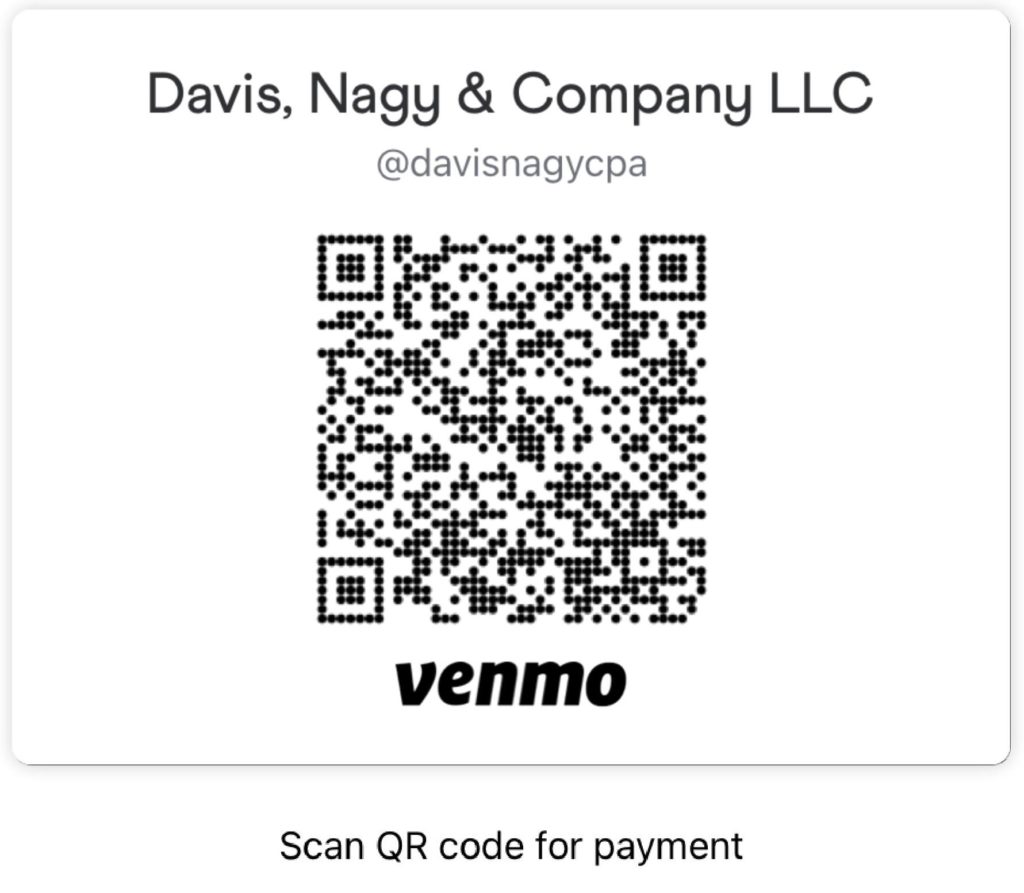Tax Returns and Planning
Tax Planning Services
With all of today’s technology, small business owners may try to manage taxes in-house in an attempt to save money. If taxes were your expertise…you would have an accounting firm. That’s where the Davis, Nagy team comes in. We are tax experts and take on all of your tax planning and preparation so you can focus on your business. Not only do we save you money, but we also save you the time and frustration of sifting through the tax jargon and paperwork.
At Davis, Nagy & Company, we handle the following tax planning and preparation services:
- Personal tax returns
- Personal tax planning
- Estate tax returns
- Trust tax returns
- Non-Profit tax returns
- Small business tax (sole proprietor)
- Small business tax planning
- Partnership taxes
- Partnership tax planning
- Corporate taxes including LLCs, Sub-chapter S, and “regular” or “C Corp” Corporate returns
- Tax planning for all of the above corporate entity types.
- IRS issue resolution on all topics as well as state and local tax issues
Non-Profit Accounting
We can assist with business taxes, including non-profit organizations. We can help you work through state and federal grant requirements, annual tax forms and we understand the importance of maintaining your tax-exempt status.
Contact us at 330.665.9405 for a free consultation today.
Resources
We have listed several resources to assist with all of your tax needs:
- Track your federal refund.
- Track your state refund.
- View and download forms or publications offered by the IRS.
- View and download forms offered by your state.
- View record retention guides for businesses and individuals.
Businesses
Keep One Year
- Bank reconciliations
- Correspondence with customers or vendors
- Duplicate deposit slips
- Purchase orders (except purchasing department copies)
- Receiving sheets
- Requisitions
- Stenographer’s notebooks
- Stockroom withdrawal forms
Keep Three Years
- General correspondence
- Employee personnel records (after termination)
- Employment applications
- Expired insurance policies
- Internal audit reports
- Internal reports
- Petty cash vouchers
- Physical inventory tags
- Savings bond registration records of employees
Keep Seven Years
- Accident reports and claims
- Accounts payable ledgers and schedules
- Accounts receivable ledgers and schedules
- Cancelled checks
- Expired contracts and leases
- Expense analysis and expense distribution schedules
- Inventories of products, materials and supplies
- Invoices to customers
- Notes receivable ledgers and schedules
- Expired option records
- Payroll records and summaries, including payments to pensioners
- Plant cost ledgers
- Purchasing department copies of purchase orders
- Sales records
- Cancelled stock and bond certificates
- Subsidiary ledgers
- Time books
- Voucher register and schedules
- Voucher for payments to vendors, employees, etc.
Keep Permanently
- Audit reports of accountants
- Cash books, charts of accounts
- Cancelled checks for important payments
- Contracts and leases still in effect
- Correspondence on legal and other important matters
- Deeds
- Mortgage and bills of sale
- Depreciation schedules
- Financial statements (end-of-year)
- General ledgers (and end-of-year trial balances)
- Insurance records, current accident reports, claims, policies
- Journals
- Minute books of directors and stockholders
- Property appraisals by outside appraisers
- Property records
- Tax returns and worksheets, revenue agents’ reports and other documents relating to determination of income tax liability
- Trademark registrations
Individuals
Keep One Year
- While it’s important to keep year-end mutual fund and IRA contribution statements forever, you don’t have to save monthly and quarterly statements once the year-end statement has arrived.
Keep Three Years
- Credit Card Statements
- Medical Bills (in case of insurance disputes)
- Utility Records
- Expired Insurance Policies
Keep Six Years
- Supporting Documents For Tax Returns
- Accident Reports and Claims
- Medical Bills (if tax-related)
- Property Records / Improvement Receipts
- Sales Receipts
- Wage Garnishments
- Other Tax-Related Bills
Keep Permanently
- CPA Audit Reports
- Legal Records
- Important Correspondence
- Income Tax Returns
- Income Tax Payment Checks
- Investment Trade Confirmations
- Retirement and Pension Records
Special Circumstances
- Car Records (keep until the car is sold)
- Credit Card Receipts (keep until verified on your statement)
- Insurance Policies (keep for the life of the policy)
- Mortgages / Deeds / Leases (keep 6 years beyond the agreement)
- Pay Stubs (keep until reconciled with your W-2)
- Property Records / improvement receipts (keep until property sold)
- Sales Receipts (keep for life of the warranty)
- Stock and Bond Records (keep for 6 years beyond selling)
- Warranties and Instructions (keep for the life of the product)
- Other Bills (keep until payment is verified on the next bill)
- Depreciation Schedules and Other Capital Asset Records (keep for 3 years after the tax life of the asset)
- Questions
- Download our easy-to-use tax organizer (pdf or excel).
- View helpful tax calculators.




